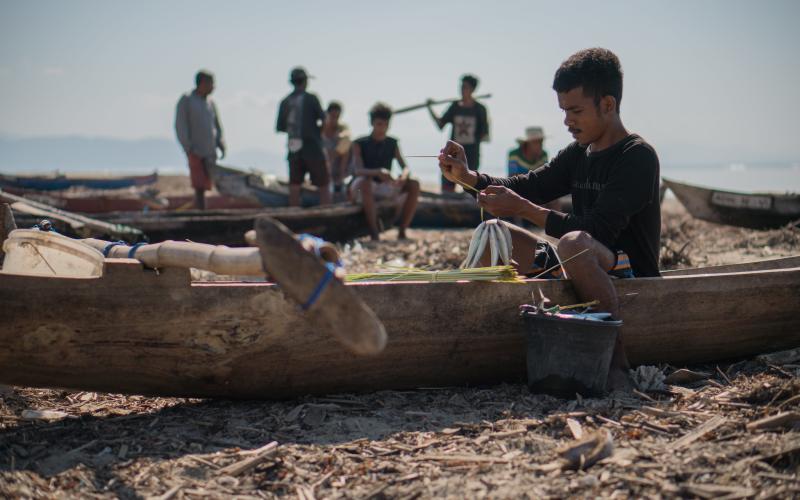
The shift towards a more equitable aquatic food systems future must include the voices and contributions of the young people so as to not leave anyone behind.
Young people today step into the world at a critical crossroads for our food systems. At present, the production, processing, distribution, consumption and disposal of our food does not work for people or our planet.
Three billion people cannot afford a healthy diet, causing one in three to suffer from malnutrition. The consequences of environmental degradation and climate change are threatening our ability to even grow enough food to nourish our increasing global population. Global inequalities, already steep before the COVID-19 pandemic, continue to deepen, as youth unemployment and under-employment rates remain stubbornly high.
While food systems remain the largest employer of youth, particularly in low- and middle-income countries, they have, so far, failed to deliver economically rewarding, intellectually stimulating, and meaningful careers that young people aspire to engage in.
Aquatic food systems, both fisheries and aquaculture, contribute to the livelihoods of 800 million people around the world. However, many of these opportunities are concentrated in segments of small-scale fisheries and aquaculture sectors that are poorly paid and frequently exploitative. Youth typically do not own boats and nets for fisheries or land for aquaculture, which are often transferred intergenerationally. In situations where youth do have rights to appropriate resources, they may have to negotiate power structures to gain access. These challenges are often amplified by gender, class, and other intersectional identities.
It is clear that food systems must change fundamentally, in order to provide equitable livelihood opportunities for young people. But how can we achieve this radical re-thinking?
A newly released report by the United Nations Committee on World Food Security’s (CFS) High-Level Panel of Experts on Food Security and Nutrition makes the case for the urgent re-adjustment of social and economic life towards an economy of well-being. This will transform food systems to become more inclusive of young people.
This approach envisions re-balancing relations between human and nature towards food sovereignty and the right to food, dignified and rewarding livelihoods, and relationships based on cooperation and solidarity. Young people are central to this shift, with youth engagement and employment in sustainable food systems both a goal to be realized, and the means for the radical transformation of food systems, the achievement of the Sustainable Development Goals and economies of wellbeing.
The realization of this transformation rests on the recognition of young people’s rights, equity and agency and their roles both as individual and collective agents of change across food systems. Achieving greater equity requires redressing imbalances in resources and power between older and younger generations, as well as implementing redistributive measures to accommodate marginalized and resource-poor groups, including youth. Agency considerations involve recognizing, facilitating and legitimizing young people as active citizens who individually and collectively are interested and capable of driving urgently needed political and economic renewal in food systems. Alongside this, the diverse intersectionalities of young people should be acknowledged and nurtured.
So, how do we envision aquatic food systems that are built on the recognition of the rights, equity and agency of all young people? The CFS report proposes five areas of action for states, social movements, farmers’ and workers’ organizations, the private sector, and youth themselves to work together in promoting young people’s participation in agriculture and food systems renewal.
For aquatic food systems, some key action areas would include:
- Policies that support the rights and access of youth--including different groups of youth such as young women--to land and water resources, facilitating the intergenerational transfer of these rights, and incentivizing initiatives such as cooperatives to facilitate youth access to production and processing resources as well as to markets and financial services.
- Educational and training programs that equip youth for livelihoods in small-scale fisheries, aquaculture, food system transformations and the facilitation of indigenous and other locally specific knowledge transfers, while supporting youth as knowledge generators in their own rights.
- Employment and labor market policies and interventions that create and support decent and meaningful employment for young people in all their diversity in aquatic food systems, protecting against exploitation and implementing social protection programs that compensate for young people’s unpaid contributions.
- Opportunities to foster sustainable technical and social innovation in small-scale fisheries and aquaculture.
- Guaranteeing and encouraging youth’s equal and active participation and leadership in formal and informal mechanisms that govern aquatic food resources, including community fisher groups, civil society, national and local decision-making spaces and initiatives by youth themselves.
Today’s young people are, in many respects, on the frontlines of the economic, political, and ecological crises of our times. Positioning young people at the heart of sustainable food systems transformations just might be the way forward in ensuring food systems that are productive, prosperous and empowering for all.
This blog was originally published as part of the Borlaug blog series by the World Food Prize Foundation.
Read the newly released report by the United Nations Committee on World Food Security’s (CFS) High-Level Panel of Experts on Food Security and Nutrition on ‘Promoting youth engagement and employment in agriculture and food systems.’
Read the new strategic brief by CGIAR’S Research Program on Fish (FISH CRP) on ‘Youth in small-scale fisheries and aquaculture,' which also calls for the urgent transformation of aquatic food systems to be inclusive of youth.